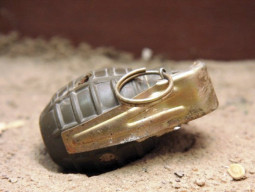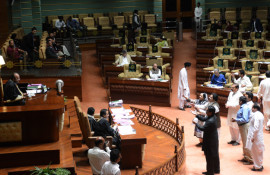
The Sindh government feels that all responsibility has been washed off its shoulders after it set up two isolation wards to counter the challenge of possible entry of the Ebola virus in Pakistan.
According to health experts, the virus would be a disaster for Sindh, in particular Karachi, once a person is diagnosed in any part of the country. "We are aware of the seriousness of the situation," said Dr Khalid Hussain Shaikh, the provincial special secretary for the public. He said that the government has initiated screening at sea points and airports.
The isolation wards have been set up at Sindh Services Hospital and Jinnah Postgraduate Medical Centre (JPMC). According to Shaikh, some of the available protectioned kits given by the World Health Organisation (WHO) have been distributed among the hospital staff.

While the JPMC officials were unavailable for comment, other sources informed The Express Tribune that no separate ward has been established in the JPMC and not even a single kit had been provided till the filing of this report.
"While there is a ward available for the [Crimean] Congo [haemorrhagic] fever patients, there are no isolation wards for the Ebola virus patients," said a source.
"Everything is under control and there is no need to spread panic as the disease has not entered into Pakistan," said health senior director Dr Zafar Ejaz. He added that even though it is the responsibility of the federal government, the provincial government is coordinating and taking all necessary measures. He said that all international travellers are being screened at Jinnah International Airport in accordance with the direction of the federal government. "It's a disease transmitted through travellers so we have to secure entry points," said Ejaz. He claimed that the provincial government has proper kits for all healthcare providers.
The Express Tribune learnt that the provincial government provided the safety kits on Monday. "We need to take extra measures," said Dr Afia Zafar, the consultant microbiologist at Aga Khan University Hospital. She said that the situation would become critical immediately after the first case is reported in Karachi.
Speaking at her lecture on 'Ebola Virus and Its Challenges' at the Pakistan Medical Association House on Tuesday, she said that the mortality rate has decreased from around 90 per cent to 55 per cent due to extra care and early diagnosis.
On the waste management, burial of the body and preparedness in Karachi, Zafar said that healthcare workers need to practise extra caution as they have a direct interaction with the affected.
She added that it is the time to make arrangements at hospitals. "The government needs to take initiatives."
While speaking to The Express Tribune, Zafar said that there is minimal chance that the virus will find its way into Pakistan. "But because people travel a lot so we can't ignore the issue," she said. "Proper screening is required at all entry points, especially at airports." She added that the government is taking measures, hoping that the disease will not enter Pakistan.
According to Zafar, 4,500 patients diagnosed with the Ebola virus have died across the world, especially in West Africa. Moreover, more than 8,000 persons have been affected by the disease so far.
The health experts called upon the government to launch awareness sessions for the general public as well as the healthcare providers.
Published in The Express Tribune, October 22nd, 2014.
COMMENTS (2)
Comments are moderated and generally will be posted if they are on-topic and not abusive.
For more information, please see our Comments FAQ
1724760612-0/Untitled-design-(12)1724760612-0-405x300.webp)




1731842248-0/Untitled-design-(21)1731842248-0-270x192.webp)











@Stranger: man....i wasted 10 seconds reading ur comment....
Err. considering that EBOLA is a killer disease , I wonder ( till the vaccination is found ) is there any point in spending ( wasting ) any money for these victims ? I fear a barrage of comments to my 'cruel' comment .